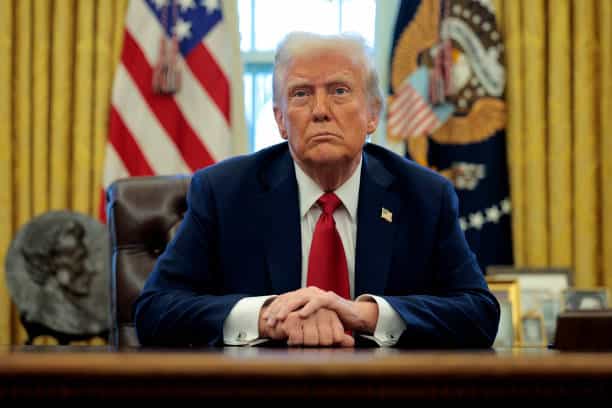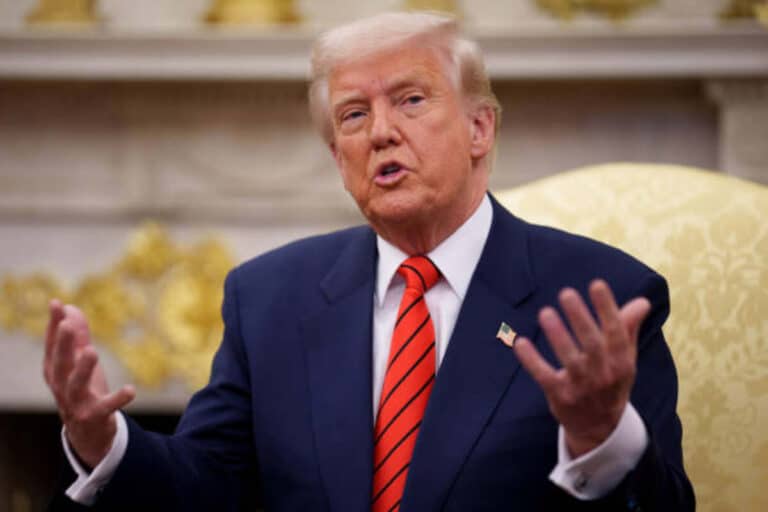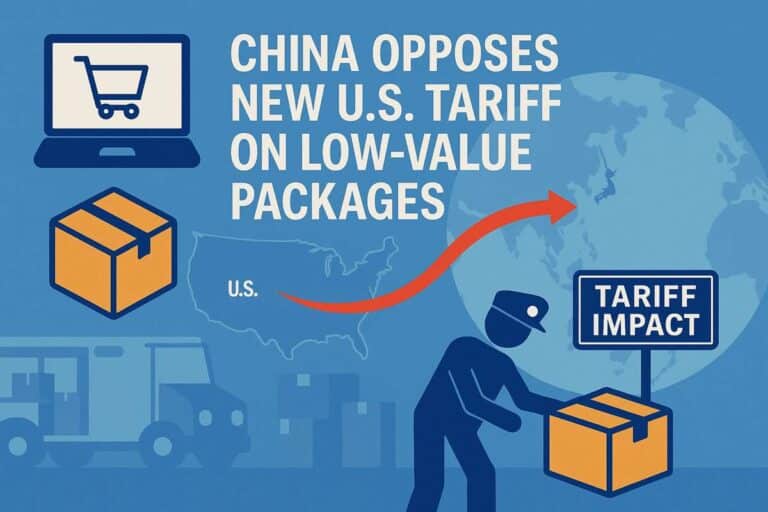

U.S. President Donald Trump talks to reporters from the Resolute Desk. (Photo by Chip Somodevilla/Getty Images)
(EPICSTORIAN) — President Donald Trump has announced a sweeping trade policy aimed at rectifying longstanding disparities in global trade.
The newly introduced Reciprocal Tariff Policy ensures that foreign countries imposing tariffs on American goods will face identical tariffs when exporting their own products to the United States.
“For the sake of fairness, we will now charge a reciprocal tariff—whatever countries charge us, we will charge them, no more, no less,” Trump stated in the announcement.
Trump’s Reciprocal Tariff Addresses Unfair Trade Practices
The policy extends beyond conventional tariffs to include Value-Added Taxes (VAT), subsidies, and non monetary trade barriers—methods that many nations use to restrict American businesses from competing fairly in global markets.
Countries that implement VAT systems, which often function similarly to tariffs, will now be treated accordingly under U.S. trade regulations. Trump also emphasized that any attempts to bypass these tariffs by rerouting goods through third-party countries will not be tolerated.
“Sending merchandise, products, or anything else through another country to undermine American trade interests will not be accepted,” he warned.
Closing Loopholes and Ensuring Fair Competition
Beyond direct tariffs, the U.S. government will factor in government subsidies and nonmonetary trade barriers imposed by other nations that effectively prevent American businesses from entering their markets.
The administration asserts that these hidden restrictions amount to economic manipulation, giving foreign competitors an unfair advantage over U.S. industries.
“We have the ability to accurately determine the cost of these non monetary trade barriers, and they will be accounted for in our reciprocal tariff measures,” Trump declared.
A Call for Global Trade Reform
For decades, the United States has shouldered an imbalance in trade, often offering favorable terms to allies and trading partners. However, Trump stressed that the time has come for other nations to recognize America’s past economic support and extend the same fair treatment to U.S. businesses.
“America has helped many countries throughout the years at great financial cost. It is now time for them to remember this and treat us fairly—a level playing field for American workers,” he asserted.
No Tariffs for U.S. Manufacturers
While the policy introduces new tariffs for imports, companies that choose to manufacture products within the United States will be exempt. The administration aims to incentivize domestic production while discouraging reliance on foreign supply chains.
Also Read:Jane Doe Withdraws Sexual Assault Lawsuit Against Jay-Z, Diddy
“There are no tariffs if you manufacture or build your product in the United States,” Trump clarified.
Implementation and Oversight
To ensure swift execution of the policy, Trump has directed Secretary of State, Secretary of Commerce, Secretary of the Treasury, and the U.S. Trade Representative (USTR) to develop and enforce the new trade framework.
“I have instructed my administration to take all necessary actions to deliver reciprocity to our system of trade,” he confirmed.
Global Reactions and Trade Implications
While supporters argue that the policy will restore economic fairness and boost American manufacturing, critics warn that it may escalate trade tensions with key partners. Analysts predict that affected nations could respond with countermeasures, potentially reshaping global trade alliances.
Also Read:‘Full Metal Jacket’ Actor Kevyn Major Howard Dies at 69
With the new tariff system in place, businesses and policymakers worldwide are closely monitoring how nations will adapt to a new era of American trade policy.







